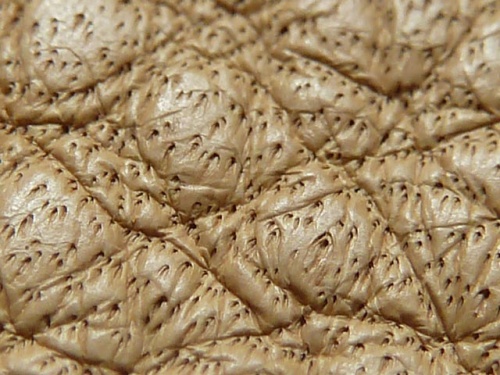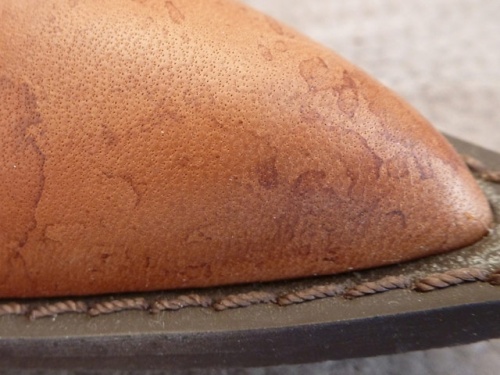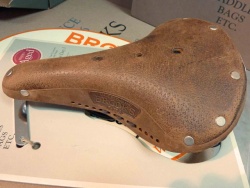Leather hair pores - Hair follicles
Contents
Leather hair pores - hair follicle - leather grain structure
Leather made from different animal species also varies in the structure of the hair pores. In some animals, the hairs grow obliquely, in some cases vertically. In others, the hair pores spread evenly over the whole skin, or the hair pores run parallel to the grain pattern.
In DIN EN 15987 (Leather Terminology - Key definitions for the leather trade - July 2015) and RAL 061 A1 (March 2016), the exterior of the leather, after removal of the hair, with its hair pore structure is called "grain". The leather of birds has feather follicles and fish leather has a scale structure.
Hair pores - feather follicles - scale structure
The pattern that generates the hair pores, provides additional information about the animal species from which the leather originates. It can also indicate the age of an animal. The number of hair pores in cattle remains the same throughout their life, which is why they are spread over a wider area in a larger animal. On the same skin surface, calfskins have up to 3 to 3.5 times more pores as on cow hides.
On cow skin, the hairs grow obliquely and are evenly distributed.
On buffaloes, the hair grows more vertically. - Peccary leather have bunches of three hairs . - Hair pores of seal skin.
The hair pores in goat leather are arranged in half-moon-shaped groups.
The hair pores in sheep leather are in rows. The pores are smaller in wool sheep skin.
Also with lamb leather the hair pores are arranged in rows.
Camel leather hair pores.
The hair pores can be easily identified on a sensitive porous boot leather.
Fine pore leather - coarse pore leather - fine grain leather - coarse grain leather
Leather surfaces are sometimes also described as fine-pored or coarse-pored or as fine-grained or coarse-grained. In the case of "fine pores" or "coarse pores", the hair pores are not always clearly defined, so can only be seen with a magnifying glass. Generally, these terms refer to the total impression of the surface. Buffalo leather surface is "coarse-pored". Not because the hair pores are so big, but because the surface has a rough structure, whereas elephant leather would be described as "coarse-grained" because of the depth of the grain and not as "coarse-pore". A fine lamb leather can be described as fine-grained or fine-pored. Experts such as leather technicians will clearly differentiate between such terms. But, in general language and in advertising, the porosity is not always associated with the actual size and/or density of the hair pores, but the general "fineness" of the surface.
Coarse pore leather: buffalo leather - bicycle saddle made of cow leather - moray eel leather
Coarse grain leather: elephant leather- crocodile leather - cow leather
Also fine pore is called smooth, soft leather without visible pores. Calfskin and lamb leather.
Fine grain is called smooth, soft leather.
On one hide: fine grain - transition - coarse grain.
Porous leather
Leather is also differentiated according to whether it`s "porous" or not. This is the ability to allow moisture to penetrate. Sometimes the breathability of leather is also meant by the ability to absorb moisture. For detailed information see "porous leather".
Video about the examination of the porosity of smooth leather.
Embossed hair pores
Sometimes the hair pores are embossed into the leather to make it look natural and also more valuable. In aniline leather and semi-aniline leather, the natural hair pores are a necessary feature. Occasionally, embossed leathers can be marketed as semi-aniline leather. The embossed pores are intended to replicate the desired optics.
Sanded, finished and embossed. The hair pores are embossed and not natural.
Sanded, finished and embossed. The hair pores are very plump embossed.
Additional information
- Leather grain - Grain side
- Porous leather
- Breathability of leather
- Top grain leather
- Embossed leather
- Corrected grain
- Full grain leather










































 a kotori web solution
a kotori web solution